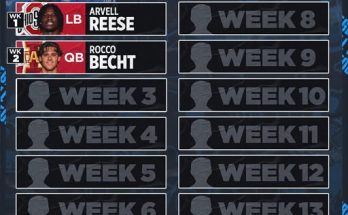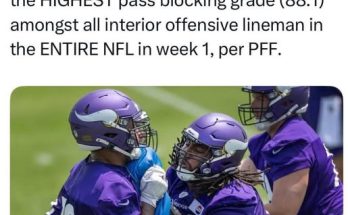T.J. McConnell’s journey to the NBA is the kind of underdog story that resonates deeply with fans and players alike because it underscores the power of persistence, self-belief, and resilience in the face of overwhelming odds. When McConnell recently revealed that he wasn’t even supposed to be in the NBA Draft Combine and was only given a chance as the “first replacement if someone drops out,” it provided a glimpse into just how precarious and uncertain his path to the league was. These words, humble yet powerful, highlight the razor-thin margins between obscurity and opportunity, particularly for players who are not heavily recruited or touted as surefire NBA prospects. McConnell’s story serves as a reminder of how preparation and mental toughness can turn the smallest sliver of opportunity into a career-defining moment. His journey from an overlooked prospect to a dependable NBA point guard has become a beacon of hope for aspiring players who may not fit the prototypical mold of an NBA star but possess the heart, work ethic, and intelligence to succeed.
McConnell, standing at 6 feet 1 inch, is not the kind of player that typically catches the eye of scouts focused on athleticism, wingspan, and highlight-reel plays. His game has always been built on fundamentals, hustle, and leadership rather than raw physical gifts. Coming out of Duquesne University and later transferring to Arizona, McConnell wasn’t widely considered an NBA prospect. The NBA Draft Combine, the league’s premier scouting event where top college players and international prospects showcase their skills in front of teams, was seemingly out of reach for him. The fact that he got a chance only because he was a replacement when someone dropped out tells a lot about where he stood in the eyes of scouts and general managers at that time. For many players, being labeled as an alternate for such an event might have been a discouraging blow, but for McConnell, it was simply another opportunity to prove himself, even if it came through the backdoor.
When McConnell recalls the words, “If someone drops out, you’re the first replacement,” it speaks volumes about the precarious nature of his early career. Many players would crumble under the weight of feeling like an afterthought, but McConnell has always thrived as an underdog. It is precisely this mentality—this relentless determination to capitalize on every chance—that has defined his career. Instead of sulking over not being on the original list, he prepared as though he belonged there all along. When the call finally came that he would get to participate, he knew there was no room for hesitation or self-doubt. He was going to show everyone that he deserved not just to be there but to be considered seriously as a future NBA player.
This narrative of resilience is not new for McConnell. He grew up in Pennsylvania with a deep love for the game, but like many undersized guards, he had to work twice as hard to prove himself. He wasn’t a five-star recruit, and he didn’t have scouts flocking to his games. His college career was marked by steady improvement and a reputation for being a tough, smart, and hardworking player. At Arizona, McConnell became known as the heartbeat of the team—a floor general who could set up his teammates, play hard-nosed defense, and lead by example. Still, despite his success at the collegiate level, NBA scouts largely dismissed him as too slow, too small, and not athletic enough to make an impact in the league. The draft combine was supposed to be for the elite prospects, the players with high ceilings and measurable athletic gifts, not for a guard like McConnell who thrived on grit and IQ. Yet, fate intervened, and McConnell seized the moment.
The significance of his draft combine appearance cannot be overstated. For many fringe prospects, the combine is their only real chance to get face time with NBA decision-makers. It is not just about drills and scrimmages but about interviews, measurements, and the chance to display intangibles like leadership and competitiveness. McConnell may not have wowed anyone with vertical leaps or blazing speed, but what he did show was his ability to run an offense, make smart plays, and bring a level of toughness and intensity that coaches value. Those qualities may not make headlines, but they are invaluable in the NBA, especially for a backup point guard or a role player who can stabilize the team when stars are resting.
After going undrafted, McConnell’s journey only became more inspiring. Instead of letting disappointment derail his dreams, he fought his way onto an NBA roster through Summer League opportunities and training camp invites. He eventually found a home with the Philadelphia 76ers, where his scrappy play, defensive pressure, and knack for making winning plays quickly earned him a reputation as a fan favorite. He carved out a niche as one of the league’s most reliable backup point guards, the kind of player who might not stuff the stat sheet but can completely change the momentum of a game with his hustle, timely steals, and unselfish play. His ability to stay in the league for years, despite all the initial doubts, is a testament to his mental fortitude and relentless work ethic.
What makes McConnell’s story resonate so deeply is that it challenges the narrative that success in the NBA is reserved only for the most athletic or naturally gifted players. While talent is undoubtedly important, McConnell proves that there is still room in the league for players who bring something less tangible but equally important: leadership, grit, and basketball IQ. His rise from being an afterthought to a respected veteran shows that the league values more than just raw physical attributes. Teams need players like McConnell—those who are willing to do the dirty work, who communicate on defense, who keep the offense organized, and who compete every single possession.
Reflecting on his journey, one can’t help but admire how McConnell has embraced every role he has been given. Whether it was fighting for minutes as an undrafted rookie or mentoring younger players as a veteran with the Indiana Pacers, he has consistently approached the game with the same determination and passion. He is not the type to complain about playing time or spotlight; instead, he focuses on making the most of every opportunity. This mindset is perhaps rooted in that very moment when he learned he was merely a “first replacement” for the draft combine. It instilled in him the idea that nothing would ever be handed to him, and that every chance—no matter how small—had to be earned and maximized.
In today’s NBA, where highlight plays and flashy athleticism often dominate social media and headlines, McConnell’s success story stands as a refreshing reminder of the fundamentals of the game. He is proof that a player who understands spacing, angles, and timing, and who plays with heart and determination, can still thrive in the league. His story is also deeply inspirational for young players who may feel overlooked. Not everyone can be a top draft pick or a highly-touted recruit, but McConnell’s career shows that with enough persistence and willingness to outwork others, it is possible to carve out a successful career at the highest level.
Moreover, McConnell’s journey highlights the unpredictable nature of opportunities in professional sports. The fact that he was on standby for the combine and only got in because of someone else’s absence shows how quickly things can change. Opportunities often come when least expected, and being prepared for that moment is what separates those who succeed from those who fade away. McConnell was ready because he never allowed self-doubt to derail his preparation. He always believed that his time would come, and when it did, he delivered.
As McConnell continues his career with the Indiana Pacers, he has become one of the most respected veterans in the locker room. Coaches and teammates alike rave about his professionalism, his leadership, and his relentless work ethic. He may not be the most recognizable name in the league, but he is the kind of player that every team needs—a stabilizer, a competitor, and a glue guy who makes everyone around him better. His journey from being an alternate for the combine to a seasoned NBA pro is not just a personal triumph but a testament to the values of perseverance, humility, and preparation.
McConnell’s reflection on not being supposed to be at the draft combine is more than just a personal anecdote; it is a powerful statement about the nature of success. It is about embracing the role of the underdog, about understanding that the path to the top is rarely straightforward, and about having the mental toughness to keep going when the odds are stacked against you. His story will continue to inspire future generations of players who dream of making it to the NBA, not because it promises them an easy road, but because it shows them that with enough heart and determination, even the most improbable dreams can become reality.



